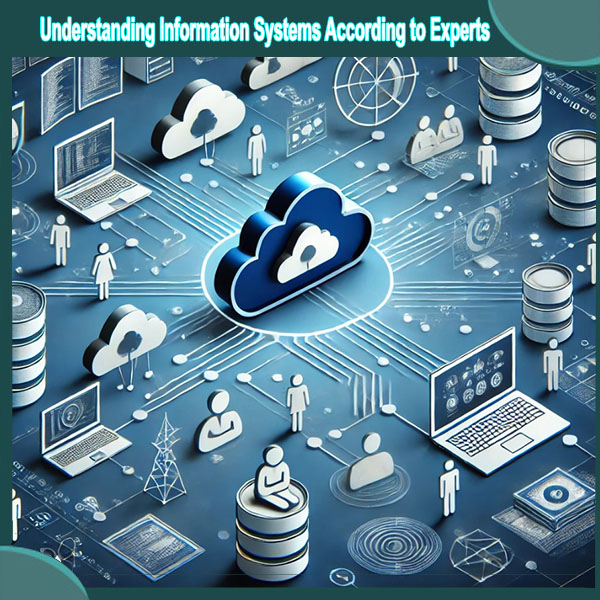Understanding Information Systems According to Experts
In today’s digital age, information systems (IS) have become an integral part of almost every organization. From managing data to streamlining business processes, information systems are vital for decision-making, productivity, and operational efficiency. But what exactly are information systems, and how do experts define and view their role in modern enterprises? This article will delve into the core aspects of information systems, providing a comprehensive understanding based on insights from industry experts.
What is an Information System?
An information system can be broadly defined as a combination of hardware, software, data, people, and procedures that work together to manage and process information. According to James O’Brien, an information system expert, an information system consists of “the integration of people, technology, and processes to collect, process, store, and disseminate information for decision-making purposes.” Essentially, IS is the backbone of how businesses and organizations manage their data and operational workflows.
Experts often categorize information systems into different types based on their functionalities. These include transaction processing systems, management information systems, decision support systems, and executive information systems. Each system type serves a specific purpose, from handling daily transactions to assisting top-level executives in making strategic decisions.
Components of Information Systems
According to Laudon and Laudon, two notable experts in the field of information systems, IS is composed of five major components:
- Hardware: The physical devices such as computers, servers, networking equipment, and data storage systems.
- Software: The applications and programs that process and manage the data.
- Data: The core information or content that the system processes, which can range from customer records to business performance metrics.
- People: The users who interact with the system and utilize the information.
- Processes: The procedures and operations that govern how data is collected, analyzed, and distributed.
Together, these components form an ecosystem that supports business operations, providing the necessary tools for companies to make informed decisions.
The Role of Information Systems in Business
The importance of information systems cannot be overstated. As noted by Peter Drucker, a renowned management consultant, “Information is data endowed with relevance and purpose.” Information systems help businesses convert raw data into meaningful information that can drive business growth.
Below are some of the key roles that information systems play in business:
1. Improving Efficiency
Information systems automate repetitive tasks, reducing human error and increasing overall productivity. For example, a transaction processing system can automatically record sales, inventory changes, and customer details, eliminating the need for manual data entry.
2. Supporting Decision-Making
Decision Support Systems (DSS), a subset of information systems, provide managers with critical data and analytical tools to make informed decisions. DSS often include tools for forecasting, risk analysis, and performance monitoring, all of which contribute to better decision-making.
3. Enhancing Communication
With the rise of cloud computing, information systems have become pivotal in facilitating communication across departments and geographies. By centralizing data in one location, organizations ensure that all stakeholders have access to the same information, fostering transparency and collaboration.
4. Gaining a Competitive Edge
Information systems allow businesses to analyze market trends, customer preferences, and competitor actions in real time. This enables companies to adjust their strategies dynamically and stay ahead of competitors. Michael Porter, a leading authority on competitive strategy, emphasizes that technology, including information systems, is a vital component of achieving a competitive advantage.
Information Systems in Different Industries
The application of information systems varies across industries, but its fundamental purpose remains consistent: improving business processes and enhancing decision-making.
1. Retail
In the retail industry, information systems are used to manage inventory, process sales transactions, and analyze consumer buying behavior. Customer Relationship Management (CRM) systems, for example, help retailers track customer interactions and tailor marketing efforts to meet consumer needs.
2. Healthcare
Information systems in healthcare play a critical role in patient management, diagnosis, and treatment planning. Electronic Health Record (EHR) systems store patient information and make it easily accessible to healthcare professionals, improving the quality of care.
3. Finance
In finance, information systems are used to track transactions, manage accounts, and analyze financial data. Financial institutions rely heavily on risk management systems to predict market fluctuations and manage investment risks effectively.
Expert Perspectives on the Future of Information Systems
According to Gartner, a leading research and advisory firm, the future of information systems will be heavily influenced by advancements in artificial intelligence (AI) and machine learning. These technologies will enable information systems to not only process data but also learn from it, providing more accurate predictions and insights.
Experts also predict the increased use of blockchain technology within information systems. Blockchain offers a secure way to manage and verify data, making it especially relevant in industries such as finance, supply chain management, and healthcare.
Additionally, cloud computing continues to redefine how information systems are deployed and maintained. As businesses transition from on-premise systems to cloud-based solutions, they benefit from increased scalability, cost efficiency, and collaboration capabilities.
Challenges Facing Information Systems
Despite the many advantages, information systems come with their own set of challenges. Experts highlight several concerns:
1. Security Risks
As organizations become more reliant on digital systems, the risk of cyberattacks increases. Information systems store sensitive data, making them prime targets for hackers. Experts emphasize the importance of implementing robust cybersecurity measures to protect data integrity.
2. Data Overload
With the explosion of data in recent years, organizations face the challenge of managing and making sense of vast amounts of information. Information systems need to evolve to handle big data effectively and ensure that valuable insights are not lost in the noise.
3. Cost of Implementation
Setting up and maintaining a comprehensive information system can be costly. Experts recommend that organizations conduct a thorough cost-benefit analysis before investing in new systems. However, the long-term gains in efficiency and decision-making usually outweigh the initial expenses.
Conclusion: The Evolving Role of Information Systems
The importance of information systems in the modern world cannot be understated. From improving operational efficiency to facilitating informed decision-making, information systems have become a vital component of organizational success. As technology continues to evolve, the role of information systems will become even more critical.
Experts agree that businesses must not only invest in information systems but also stay updated on the latest trends and advancements in the field. With the rise of AI, blockchain, and cloud computing, the potential for innovation within information systems is endless.
Ultimately, understanding the power of information systems is key to harnessing their full potential and staying competitive in today’s fast-paced business environment.



